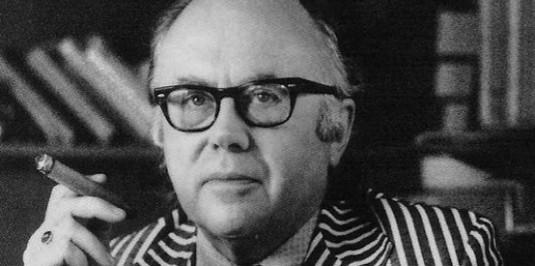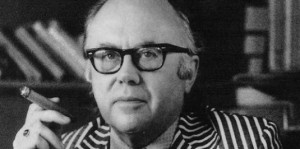Russell Kirk was one of the leading thinkers of the post-Second World War American conservative movement. His most famous work, The Conservative Mind is still in print along with some others. Bradley Birzer’s capacious and enlightening biography is well worth reading by anyone with an interest in American conservatism. Kirk’s mature conservatism (early on he was much influenced by libertarianism) was of a traditionalist sort, more moral, literary, and religious than political and policy oriented.. Kirk eventually became a Christian though he continued to be influenced by non-Christian thinkers like the Stoics and Irving Babbitt. Over the years, Dr. Birzer argues, Kirk’s conservatism developed into a type of Christian humanism. But Dr. Birzer does not slight his pre-Christian youth, for example, noting the horror Kirk felt at the internment of Japanese Americans during the Second Word War and the dropping of the two atomic bombs on Japan.
Th Conservative Mind is comprised of essays discussing a number of thinkers, mostly English and American. With the intellectual dominance of the Left in the mid-century United States, Kirk’s book argued both that the non-Left had deep roots in American history and was intellectually respectable. Dr. Birzer shows how seriously the book was taken by Americans across the political spectrum. and how it fit into the conservative revival of the time. Kirk was a very prolific writer and continued to be an important presence on the Right until his death in 1994. In addition to writing a number of books of depth, he wrote regularly for National Review as well as for other magazines and had his own syndicated newspaper column. He was also quite active in the 1964 Goldwater presidential campaign and was supportive of those of Ronald Reagan and Patrick Buchanan.
Dr. Birzer holds the Kirk Chair in History at Hillsdale College and is in fundamental agreement with Kirk’s conservatism, but he gives a fair amount space to critics. He himself seems to gently agree with the criticism that Kirk devoted too much time to politics, time that would have been better spent in trying to leaven the culture. The book demonstrates Kirk’s vexed, at times ambiguous, relationship to libertarianism and neoconservatism. Kirk had specific differences with each but, more generally, he was suspicious of political blueprints that posited one best way to organize society. In part this was a philosophical objection, and in part due to his delight in variety and consequent strong distaste for cultural homogenization. This disrelishment was manifest regardless if such homogenization arose from socialism or capitalism. At the same time, while opposed to American militaristic imperialism, he thought the country could provide an example to others. It is a strength of the book that Dr. Birzer does not attempt to smooth over such tensions and perhaps contradictions within Kirk’s thought and life.
Kirk’s conservatism involved a realization of the limits of human wisdom and virtue and thus had a respect for the past and its accumulated wisdom. Even, so, this was not a blind reverence as he recognized reform and change were sometimes necessary. So he was opposed to Utopian schemes, writing. “for the conservative, politics is the art of the possible, not the art of the ideal.” Because Kirk did not prioritize politics and was opposed to systematization, it is fair to call his conservatism an attitude rather than an ideology and this will make some on the Right impatient with it. In one of his most explicit passages, Dr. Birzer writes (of Kirk’s leaving as editor of the journal Modern Age), “Without Kirk to shape a conservative movement as a mood, a predilection, and a predisposition, conservatism narrowed and divided, permitting one part of it–the political–to represent the whole. As of the writing of this book, loud, obnoxious, and plastic radio and television personalities dominate the voice of conservatism as understood by the American public…Kirk’s conservatism…has almost nothing in common with the populist, popular conservatism of today’s modern media.”
I would be remiss if I did not mention one weakness in this otherwise sober-minded, measured history. In a speech at the Heritage Foundation late in his life, after saying that neoconservatism was led by Jews he stated, “And not seldom it has seemed as if some eminent Neoconservatives mistook Tel Aviv for the capital of the United States.” Dr. Birzer tries to defend Kirk from the resultant charges of anti-semitism. His efforts suffer by comparison with how Kirk himself dealt with some anti-Jewish elements in the writings of T.S. Eliot (a friend of, and tremendous influence upon, Kirk). In his book Eliot and His Age, Kirk does not deny prejudice and insensitivity on the part of Eliot even while maintaining he was not an anti-semite. While Kirk’s discussion is not immune to criticism, I think Dr. Birzer would have done better to follow Kirk’s example.
For the rest, Dr. Birzer’s book is a valuable addition to the history of American conservatism.


